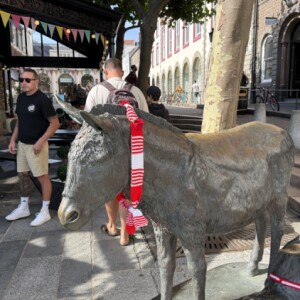WI Guernsey…
supporting the Red Roses in the Rugby Women’s’ World Cup.
They also put a scarf around the donkey to show his support (pic in extras) but on a day like this he must have been far too hot! Well it is Silly Saturday;-)
My saying today is ‘third time lucky’.
The origin of "third time lucky," and its more common variant "third time's the charm," is rooted in the ancient and widespread association of the number three with luck, the divine, and completeness, although specific origins are uncertain. Early documented uses include "the luck of the third adventure" in 1839 and "Third time's lucky" in an 1862 Scottish proverb collection, with the sentiment being even older. The idea could also stem from the "Holy Trinity" of Christianity or from a supposed Old English law where surviving a third hanging led to freedom, such as the case of John "Babbacombe" Lee.
Possible Origins & Influences
Ancient Beliefs in the Number Three:
The number three is often seen as magical and a symbol of good luck in many cultures and belief systems.
Christianity:
The number three is central to the Christian concept of the Holy Trinity, which is believed to bestow fortune.
Historical Legal Cases:
The story of John "Babbacombe" Lee, who was to be hanged in Exeter Prison and survived three attempts, is often cited as an inspiration.
Greek Mythology:
The third cup of wine in a libation was offered to Zeus the Saviour a prayer for good luck.
Early Appearances in Print
1721 (Scotland): The sentiment of "third time lucky" appears in James Kelly's Scottish Proverbs Collected, with the phrase "All things thrive at thrice".
1839 (England): A variation, "The luck of the third adventure," is found in Elizabeth Barrett Browning's Letters.
1862 (Scotland): Alexander Hislop's The Proverbs of Scotland includes "Third time's lucky".
Evolution to "Third Time's the Charm"
The phrase "third time's a charm" is a more recent, American variant that emerged around the turn of the 20th century.
One of the earliest printed examples of "third time's the charm" is from 1912.


Comments
Sign in or get an account to comment.


